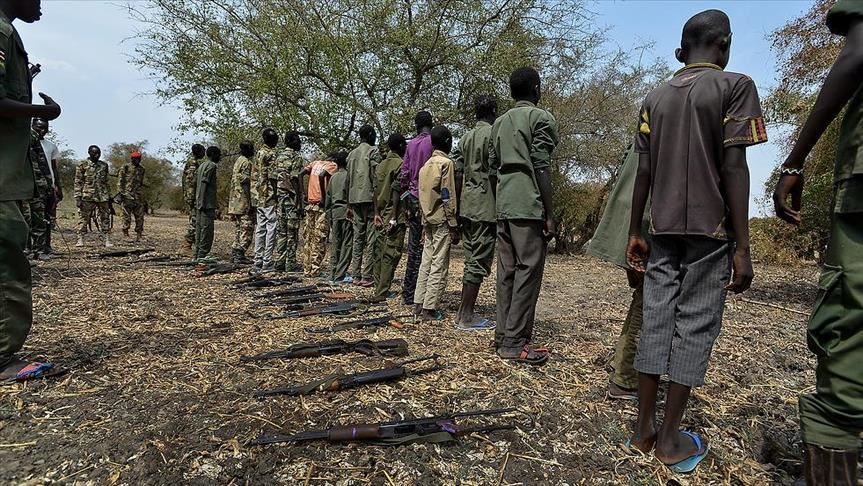South Sudan child soldiers attempt to rebuild lives
Dodging death over past two decades, child recruits face tough task to switch over from holding rifles to school bags

BOR, South Sudan
Makuei Anyieth was recruited in the Sudan People’s Liberation Army (SPLA), at the tender age of 11.
Dodging death over past two decades, while fighting numerous battles, Anyieth, now 33, is attempting to wash the tag of a child soldier, by rebuilding his life.
Thousands of battle-hardened children like Anyieth, who fought in the South Sudan conflict, under commanders from both government and opposition forces, are facing an uncertain future.
The transition from waving a Kalashnikov rifle, to holding pen and books is, however, appearing a daunting task.

Makuei Anyieth was recruited in the Sudan People’s Liberation Army (SPLA), at the tender age of 11
“When you recruit young people in the army, they will not have any bright future,” Anyieth told Anadolu Agency in an interview in Bor, the capital city of Jonglei province in South Sudan.
Pursuing a degree in John Garang University in Bor, Anyieth recalled that he had joined armed group, after his father was killed in the battle field.
While he does not regret being part of the liberation struggle for South Sudan, he laments at the use of children in the armed conflicts.
“Even when there is peace, they only think of fighting. Many of them get introduced to drugs and spoil their life and also country’s progress,” he said.
19,000 child soldiers used in conflict
According to the UN Children’s Fund (UNICEF) 19,000 children may have been used in the South Sudan’s civil war, which began in December 2013, when soldiers loyal to President Salva Kiir and former Vice President Riek Machar, now the rebel leader, fought in Juba, the capital.
The African Charter stipulating the rights and welfare of children, signed by South Sudan, prohibits recruitment of children for battles.
Kuol Ajak Kuol Nyuon, had joined the battlefield at 15, in 2015, when he hardly knew about the motive of fighting.

Kuol Ajak Kuol Nyuon, had joined the battlefield at 15, in 2015, when he hardly knew about the motive of fighting.
“I had no idea about politics. I joined the army, because people used to be displaced from their houses,” Nyuon told Anadolu Agency. His uncle prevailed upon his commander, to relieve him from services. He is now back in school.
Sitting pretty in his school, Nyuon says that many of his friends are still in the army, fighting and are deprived of education. The children have horrific experiences to relate.
Pressure is piling up on the South Sudan government as well as on the opposition groups to abandon practice of recruiting children. They are also under pressure to relieve existing child soldiers and allow them to return to schools.
According to activist David Garang Goch, besides the forced recruitment, socio-economic issues also play a major party in the children’s enrollment in armed groups.
“Many children had joined fighting forces, because of lack of opportunities,” said Goch.
Goch said the government must strengthen the Disarmament, Demobilization, and Reintegration (DDR) Commission, to ensure children are relieved from the army.Also, there is need to set up vocational training centers for former child soldiers, to allow them a smooth transition from a battle-hardened life to normal civilian life.
Recruitment of children prolongs violence
Mary Dok, one of the mothers taking care of child soldiers in Ethiopia, said the practice of recruiting children to fight in conflicts is appalling.
“We did not feel happy as mothers when our children were taken away, to join the army because we did not know, what will happen to them. During those days, I have seen our children eating unhealthy food, “she said.
Local Bor Area Chief Agot Kou said the recruitment of children was responsible for prolonging the violence. It has also potential to turn them to criminals.
Jonglei State’s Minister for Gender, Child and Social Welfare, Rachel Amuor Pach said the government was planning to invest in child education programs. He said the government was also making it sure to protect children from army recruitment.
“This [use of] child soldiers were a past practice, but now I do not think it is the intention of our government, or even opposition forces to continue with the practice,” Pach told Anadolu agency.
South Sudan has enacted a law in 2008, dedicated to the protection of children.
According to Article 31, of the South Sudan Child Rights Act, 2008, the government has committed itself that no child shall be recruited or engaged in any military or paramilitary activities.
The law further states that children will not be used for even limited work, like as sentries, informants, agents or spies, cooks, in transport, laborers, for sexual purposes, or any other forms of work that do not serve the interests of the child.
The law also stipulates penalties. Any commander found recruiting children shall face an imprisonment, for a term of 10 years or with a fine or with both.
Civil society activists, however, said that despite enactment of such stringent laws, the future of children, who have fought battles hangs in balance.
Anadolu Agency website contains only a portion of the news stories offered to subscribers in the AA News Broadcasting System (HAS), and in summarized form. Please contact us for subscription options.







